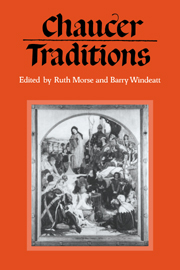Book contents
- Frontmatter
- Contents
- List of contributors
- Preface
- Note on the text
- 1 Chaucer traditions
- 2 Gower–Chaucer's heir?
- 3 Chaucer and Lydgate
- 4 Hoccleve and Chaucer
- 5 Chaucer and fifteenth-century romance: Partonope of Blois
- 6 Some Chaucerian themes in Scottish writers
- 7 The planetary gods in Chaucer and Henryson
- 8 Gavin Douglas: ‘Off Eloquence the flowand balmy strand’
- 9 Skelton's Garlande of Laurell and the Chaucerian tradition
- 10 Chaucerian metre and early Tudor songs
- 11 Aspects of the Chaucerian apocrypha: animadversions on William Thynne's edition of the Plowman's Tale
- 12 The shape-shiftings of the Wife of Bath, 1395–1670
- 13 The genius to improve an invention: transformations of the Knight's Tale
- 14 From the Clerk's Tale to The Winter's Tale
- 15 The Virtuoso's Troilus
- 16 Rewriting romance: Chaucer's and Dryden's Wife of Bath's Tale
- 17 Chaucer's religion and the Chaucer religion
- 18 A list of the published writings of Derek Brewer
- Index
11 - Aspects of the Chaucerian apocrypha: animadversions on William Thynne's edition of the Plowman's Tale
Published online by Cambridge University Press: 23 September 2009
- Frontmatter
- Contents
- List of contributors
- Preface
- Note on the text
- 1 Chaucer traditions
- 2 Gower–Chaucer's heir?
- 3 Chaucer and Lydgate
- 4 Hoccleve and Chaucer
- 5 Chaucer and fifteenth-century romance: Partonope of Blois
- 6 Some Chaucerian themes in Scottish writers
- 7 The planetary gods in Chaucer and Henryson
- 8 Gavin Douglas: ‘Off Eloquence the flowand balmy strand’
- 9 Skelton's Garlande of Laurell and the Chaucerian tradition
- 10 Chaucerian metre and early Tudor songs
- 11 Aspects of the Chaucerian apocrypha: animadversions on William Thynne's edition of the Plowman's Tale
- 12 The shape-shiftings of the Wife of Bath, 1395–1670
- 13 The genius to improve an invention: transformations of the Knight's Tale
- 14 From the Clerk's Tale to The Winter's Tale
- 15 The Virtuoso's Troilus
- 16 Rewriting romance: Chaucer's and Dryden's Wife of Bath's Tale
- 17 Chaucer's religion and the Chaucer religion
- 18 A list of the published writings of Derek Brewer
- Index
Summary
The single most important aspect of the formation of Chaucer's canon is the record of critical judgement which adjudicated between the apocryphal and the authorial works. Despite this important inter-textual relationship, the judgement of R. H. Robbins, and most recently Russell Peck, that ‘the Chaucer apocrypha is at present the most neglected area of Chaucer and fifteenth-century studies’ is substantially correct.
For the last half century, all the major editions of Chaucer, namely those of Robinson, Baugh, Fisher and the Riverside, have accepted the cumulative judgements of Tyrwhitt, Bradshaw, Skeat and Hammond concerning the canon. There is no explicit analysis in Howard's biography or in the general preface to the Variorum Chaucer of the apocrypha's relationship to the canon as a problematic nor of the heuristic process out of which the canon evolved.
Baker, however, in addressing the rationale for a variorum in his preface to the facsimile of the Hengwrt Manuscript acknowledges that ‘Chaucer's text has never had the stable tradition that Milton's has had, and as a result each century has had its own Chaucer.’ Baker's remarks, if restricted to the idea of text as strictly authorial composition, are undoubtedly correct. However, the canons of most medieval authors share this lack of stability. The fixed canon had to await the development of print and more sophisticated editorial methods.
- Type
- Chapter
- Information
- Chaucer TraditionsStudies in Honour of Derek Brewer, pp. 155 - 167Publisher: Cambridge University PressPrint publication year: 1990
- 2
- Cited by



